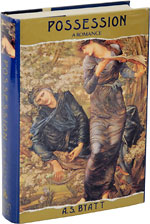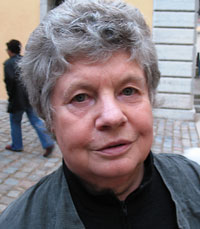Possession at 20
A. S. Byatt and Nicholas Basbanes discuss Byatt’s grand bibliophilic novel
By Nicholas A. Basbanes  Nicholas A. Basbanes recently received a National Endowment for the Humanities fellowship to work on his book on paper, which is forthcoming from Knopf. His most recent book is Editions & Impressions, a collection of essays. His other works include the acclaimed A Gentle Madness, Every Book Its Reader, Patience & Fortitude, Among the Gently Mad, and A Splendor of Letters.
Nicholas A. Basbanes recently received a National Endowment for the Humanities fellowship to work on his book on paper, which is forthcoming from Knopf. His most recent book is Editions & Impressions, a collection of essays. His other works include the acclaimed A Gentle Madness, Every Book Its Reader, Patience & Fortitude, Among the Gently Mad, and A Splendor of Letters.

Twenty years ago, A. S. Byatt published Possession, a novel that appealed to bibliophiles as much or more than Umberto Eco’s The Name of the Rose had ten years earlier. Possession follows two young academics as they uncover a secret affair between two nineteenth-century poets. The novel’s main subject heading in the Library of Congress catalogue is Manuscripts—Collectors and collecting—England—Fiction, which is telling. Old letters and manuscripts are found stuck in dusty old books and mysterious old houses, as the two scholars attempt to safeguard literary history from an unscrupulous American collector.
Possession won Britain’s Booker Prize in 1990 and was wildly acclaimed as the author’s breakthrough book. It also became a New York Times bestseller. Since then, Byatt has earned an international reputation for her erudite novels, including The Biographer’s Tale, Babel Tower, and, most recently, The Children’s Book. She was appointed a DBE (dame commander of the order of the British Empire) in 1999.
Nicholas Basbanes conducted the following interview with Byatt in Boston on May 31, 1996. A full transcript is included in Basbanes’ new book, About the Author: Inside the Creative Process –Ed.
NAB: Do you see your books as a corpus, as a body of work?
ASB: What? All my work?
NAB: Yes.
ASB: Well, I haven’t said this before, but I had this interesting idea. I wrote Possession which is set in the time of Darwin’s writing of On the Origin of Species, in 1859. And then I wrote Angels and Insects. The insects bit hit in the 1860s, and the angels bit moves on into the 1870s and 1880s. I have a novel I want to write next when I finish the quartet that is about that kind of group of people in the 1890s and 1900s, I think from the point of view of a children’s writer, like E. Nesbit. She lived in a world which contained all the geneticists who believed in eugenics and all the proto-socialists. She knew H. G. Wells very well. He tried to seduce her daughter. She knew George Bernard Shaw. It won’t be like that, but that world. I’ve got a great historical run, and the one I want to do after that, which doesn’t yet have a title, is about two women psychoanalysts. I wanted to do an American and a middle European. But I think I can’t write an American, so I think I’ll write an Englishwoman psychoanalyst, and in the time of Freud and Jung.
NAB: You have a pretty good American in Possession, though?
ASB: Well, I was rather fond of both my Americans in Possession, but I do know that they were brought out by being caricatures. I taught American literature for a long time, and I made Professor Crocker out of all the preoccupations of nineteenth-century American literature—you know, the kind of Gothic interest, the Edgar Allen Poe interest in mortality. He came out of all those communes sprinkled around the times of Henry James.
NAB: Do you write on a computer?
ASB: No, I write with a pen, which produces the kind of writing I like. I do my journalism on a computer. But I do it mostly by not looking at it and just thinking it in my head and typing it off the keys. I don’t look at it much when I’m actually doing it.








